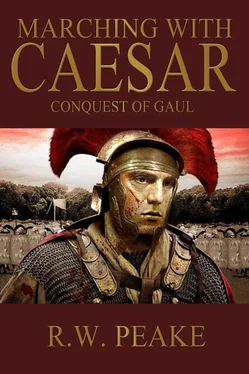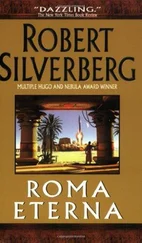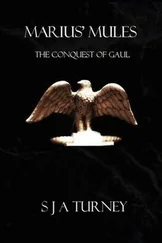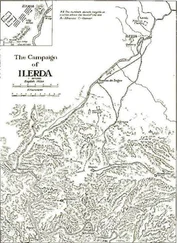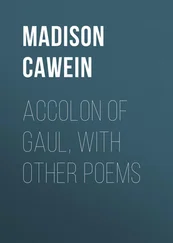R. Peake - Marching With Caesar - Conquest of Gaul
Здесь есть возможность читать онлайн «R. Peake - Marching With Caesar - Conquest of Gaul» весь текст электронной книги совершенно бесплатно (целиком полную версию без сокращений). В некоторых случаях можно слушать аудио, скачать через торрент в формате fb2 и присутствует краткое содержание. Жанр: Исторические приключения, на английском языке. Описание произведения, (предисловие) а так же отзывы посетителей доступны на портале библиотеки ЛибКат.
- Название:Marching With Caesar: Conquest of Gaul
- Автор:
- Жанр:
- Год:неизвестен
- ISBN:нет данных
- Рейтинг книги:3 / 5. Голосов: 1
-
Избранное:Добавить в избранное
- Отзывы:
-
Ваша оценка:
- 60
- 1
- 2
- 3
- 4
- 5
Marching With Caesar: Conquest of Gaul: краткое содержание, описание и аннотация
Предлагаем к чтению аннотацию, описание, краткое содержание или предисловие (зависит от того, что написал сам автор книги «Marching With Caesar: Conquest of Gaul»). Если вы не нашли необходимую информацию о книге — напишите в комментариях, мы постараемся отыскать её.
Marching With Caesar: Conquest of Gaul — читать онлайн бесплатно полную книгу (весь текст) целиком
Ниже представлен текст книги, разбитый по страницам. Система сохранения места последней прочитанной страницы, позволяет с удобством читать онлайн бесплатно книгу «Marching With Caesar: Conquest of Gaul», без необходимости каждый раз заново искать на чём Вы остановились. Поставьте закладку, и сможете в любой момент перейти на страницу, на которой закончили чтение.
Интервал:
Закладка:
At around midnight that first night, a messenger arrived with an urgent request for help from Iccius, the Remi leader who had approached Caesar about an alliance. It turned out that the Belgae, having learned of the Remi’s choice to side with Rome, changed the direction of their march to the west to besiege the Remi’s capital at a town called Bibrax. Iccius begged Caesar to send help, since he was not confident that his small force could withstand a siege by a force of the size that was facing him. Caesar responded by sending a detachment from the auxiliary forces, consisting of Numidian javelineers, Cretan archers and Balearic slingers, all missile troops, who left shortly before dawn. Lightly armed, they were able to quickly travel the seven miles to the town, finding it completely blockaded by the Belgae, whose idea of siegecraft was to surround a town with their warriors then use missiles to scour the parapets of the enemy. Apparently their hope was that the warriors holding the town would finally become discouraged and just give up. The Belgae had no conception of siege engines, and Bibrax was built on a steep hill, with the southern approach being an escarpment, which the Belgae did not think to invest. Consequently, it was short work for our auxiliaries to drive the Belgae away from the town, who instead took out their frustration on the surrounding countryside, putting it to the torch. Satisfied that they made their point, the Belgae resumed their march towards our encampment, arriving after nightfall of the same day that they were repulsed from Bibrax, proceeding to build a camp that was so huge that they were required to use signal fires to communicate from one end to the other. Their campfires extended as far as the eye could see, with the nearest end of their camp perhaps a mile on the other side of the small river and even with the eastern end of our camp. Since the terrain was fairly flat and open and we still could not see the far end of their camp, it had to have been more than three miles in length, a fact that, even with our confidence, unnerved us a bit. It even instilled in Caesar a sense of caution, prompting him to decide to give himself more time to judge the fighting qualities of the huge army before us. To that end, the next morning he sent out a number of cavalry patrols that clashed with similar contingents of Belgae presumably sent out by Galba to do the same thing in testing our ability to fight. We were pleasantly surprised when we saw that our cavalry took the measure of their foes in every skirmish they fought that day, and this outcome convinced Caesar to send us out to challenge the Belgae the next morning.
Six Legions marched out of the camp that morning, with the 13th and 14th staying in the camp to guard it. We were in our place on the right wing, with the camp to our right rear and the other Legions arranged roughly perpendicular to the northwest corner of the camp wall. The moment the Belgae saw us march out, they began to stream out of their own camp to face us, with the small river and the morass between us. In order to attack, they would have to cross the morass, with the southern edge of it just within range of our javelins, while the far bank was in range of our artillery. The Belgae formed up just beyond this, whereupon we stood and stared at each other, our side impassively watching the Belgae work themselves up into a frenzy. However, Galba never gave the order to attack, obviously worried about the problem of crossing the swampy ground under fire. Instead they settled for shaking their weapons at us and bellowing promises of all that they would do to us, as first one individual then another among them worked up the courage to dash up to the bank of the river. Standing there, they would yell some insult at us, usually accompanied by the baring of their backside, before scurrying back to the safety of the horde before our artillerymen decided to poke a hole through them. The Belgic army was arrayed in the traditional three wings, except that because of their numbers each wing, consisting of three lines like our own, dwarfed our entire line of six Legions. Still, despite this huge advantage, they refused to advance.
“This is getting boring,” I heard Vibius say, and I had to agree.
It seemed to us that we spent a lot of time standing waiting for Gauls to work up the nerve to attack, and it tended to get monotonous. Because of the immense size of their army, it was difficult for us to keep track of smaller detachments, so it was with some surprise that a courier sent from Sabinus back at the fort at the bridge came galloping up looking for Caesar, who as usual was commanding our wing. He carried a warning that the Belgae had sent scouts about two miles west and found a ford, and were now making for it with a large detachment from the main army, apparently sending men from their third line where we could not see them. Caesar immediately wheeled his horse, and commanding the auxiliary missile troops to follow him, galloped away to head off the danger to our rear, with the cavalry in tow. While this Belgae force crossing the ford was not large enough to defeat us, it was more likely that they would turn to lay waste to the Remi fields that supplied our grain. If that happened we would be forced to move because of lack of food, making stopping them imperative to our overall goal. Caesar and his force reached the ford to find that a small group had indeed made it across, but the bulk of the troops were still on the other side. The water at this spot was waist deep, and Belgae were wading across as quickly as they could, so Caesar ordered the cavalry to deal with the few men who made it to our side as he deployed the auxiliary missile troops, who began firing on the Belgae in the water. There was an immense slaughter at the ford, with our troops standing off at a distance to send a hail of arrows, stones and javelins into the bodies of the warriors trying desperately to get across the river. Bodies began to pile up in the current, the men crossing behind the dead and wounded now having the added difficulty of clambering over the bodies as they tried desperately to close with our missile troops. Soldiers, no matter who they fight for, hate the men who use bows and slings, thinking it a cowardly way of waging war, and no doubt it was this hatred that spurred the Belgae on in their attempt to exact their revenge on our troops. It was less of a skirmish or battle than it was a slaughter, and it was over in less than a third of a watch, ending with the river choked with the bodies of the dead, polluting the water with their blood.
Once the attempt to force a crossing at the ford failed, the Belgae chief Galba obviously made the decision that a battle under these conditions was worse than pointless. We were in a strong position, with artillery support, on terrain that favored us, and that was enough to force the Belgae to begin streaming back into their camp. Waiting until they retired before marching back to our own camp, we were suspicious of some sort of trick. This was no deception, however; the Belgae were done as far as fighting that or the next day. Evidently, there was a council of some sort and a decision was made that we became aware of around midnight, when without warning, the Belgae began streaming out of their camp, except this time not to face us, choosing instead to head in the opposite direction. The racket their withdrawal caused convinced the officer of the watch to sound the alarm, so we scrambled up from our cots, got dressed and donned our gear, forming up ready to march within a few moments. The guards on the walls relayed down to us what was happening, and we were of the same mind that this was some sort of ruse, so we waited quietly for the order to be given to repel an attack on our walls. But it was no ruse; when daybreak came, Caesar sent a patrol out, and they returned shortly to assure Caesar that the camp was indeed empty, the Belgae having fled in the night. Later we learned from prisoners that the chiefs of each of the tribes represented demanded a council be held, with a vote taken that each tribe return to its own lands to wait our approach. A pact was made that the first tribe attacked would sound the alarm, whereupon all the tribes would converge on that point to mass together to crush us. Once Caesar deemed that it was no trick, he immediately ordered the cavalry, the 10th, 11th and 12th out of the camp in pursuit in order to inflict as much damage as we could on the retreating horde. We were assembled and ready to march very quickly, moving out after the enemy, setting a quick pace because we carried nothing but our weapons and a canteen of water. It took much less than a full watch before we spotted the rear of the massive column, and our cavalry went flying off in pursuit, while we shook out into an aciesduplex , five Cohorts from each Legion in each line, the Centuries lined up side by side to provide the widest coverage instead of our normal three Century front. The cavalry came at the Belgae at an angle, slicing across the fleeing column and effectively cutting off a group of men who were now faced with cavalry pushing them back towards the Legions. If they turned to try and flee, their backs would be to the cavalry, as close to certain death as one can get, but if they stood their backs would be to us as we advanced, just as certain an end. Quick work was made of these men, effectively cutting them down from behind as they fought the cavalry to their front. Once we were finished with them, the cavalry went off in pursuit of more prey, performing the same maneuver, with the same result. Most of the day passed in this manner, carving up small groups of the rearguard, most of them fighting bravely, yet without any sense of cohesion. If the larger body of men had simply turned and attacked us, we would have been in trouble, except they were more intent on using their comrades’ death as a means of getting farther away, making killing the members of the rearguard easier. Finally we stopped simply because we were running out of time to return back to camp before dark, and we were definitely aware that being caught out in the dark could be a problem. There was no time to build our own camp and have it ready before it got dark, so Labienus ordered us to turn around, marching at a fast pace back to the camp. I am not sure how many Belgae we killed, but I would guess that it was three or four thousand.
Читать дальшеИнтервал:
Закладка:
Похожие книги на «Marching With Caesar: Conquest of Gaul»
Представляем Вашему вниманию похожие книги на «Marching With Caesar: Conquest of Gaul» списком для выбора. Мы отобрали схожую по названию и смыслу литературу в надежде предоставить читателям больше вариантов отыскать новые, интересные, ещё непрочитанные произведения.
Обсуждение, отзывы о книге «Marching With Caesar: Conquest of Gaul» и просто собственные мнения читателей. Оставьте ваши комментарии, напишите, что Вы думаете о произведении, его смысле или главных героях. Укажите что конкретно понравилось, а что нет, и почему Вы так считаете.
